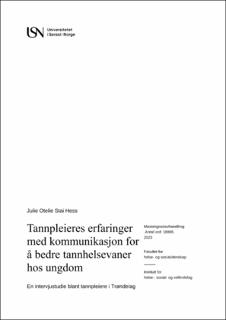| dc.contributor.advisor | Johnsen, Tone Langjordet | |
| dc.contributor.author | Hess, Julie Otelie Stai | |
| dc.date.accessioned | 2024-01-24T17:41:15Z | |
| dc.date.available | 2024-01-24T17:41:15Z | |
| dc.date.issued | 2023 | |
| dc.identifier | no.usn:wiseflow:6970552:56563765 | |
| dc.identifier.uri | https://hdl.handle.net/11250/3113652 | |
| dc.description.abstract | Bakgrunn: Denne studien ser på hvordan tannpleiere kommuniserer med ungdommer, og om de bruker motiverende intervju. Helsedirektoratet anbefaler at tannhelsepersonell bruker motiverende intervju for å endre tannhelseatferd hos ungdom. Det finnes lite forskning på hvordan tannpleierne opplever kommunikasjonen med ungdomspasienter for å endre helsevaner. Dette temaet ble valgt fordi det er viktig å vite hvordan tannpleiere kommuniserer med ungdom. God kommunikasjon er en forutsetning for god relasjon mellom tannpleier og ungdom, og et viktig verktøy for å endre ungdommers tannhelsevaner.
Problemstillingen for denne studien: “Hvordan kommuniserer tannpleiere med ungdom for å bedre tannhelsevaner”.
Metode: En intervjustudie med en fenomenologisk tilnærming ble valgt som metode. Utvalget i denne studien består av ti tannpleiere som jobber i offentlig sektor, i Trøndelag fylkeskommune. En semistrukturert intervjuguide ble benyttet i intervjuene. Intervjuene ble analysert med tematisk analyse.
Teori: Jeg har valgt selvbestemmelsesteorien som utgangspunkt for denne masteroppgaven. Selvbestemmelsesteorien belyser sentrale faktorer som kan bidra til atferdsendring og motivasjon, og kan dermed kan gi god støtte til tolkning av studiens resultater.
Resultat: Flere av tannpleierne forteller at de ikke bruker noen faste teknikker i kommunikasjonen med ungdom. Motiverende intervju blir omtalt som en stor og kompleks teknikk. Tannpleierne er opptatt av å være hyggelig og snill i møte med ungdom. De ønsker å ikke virke dømmende. Å la være å gi råd er noe flere tannpleiere forteller er viktig. Flere tannpleiere forteller at de ikke har hatt noen opplæring i kommunikasjon eller motiverende intervju etter at de begynte å jobbe som tannpleier. Det blir nevnt at det hadde vært fint med mere repetisjon og påminnelser i hvordan man skal kommunisere med ungdom.
Konklusjon: Det er behov for å implementere motiverende intervju i fylkeskommunen og å bruke tid på å styrke tannpleierne i å bruke motiverende intervju i møte med ungdom. Foreldre kan være en viktig ressurs i å støtte ungdom til å bedre tannhelsevaner. | |
| dc.description.abstract | Background: This study looks at how dental hygienists communicate with adolescents, and whether they use motivational interviewing. The Norwegian Directorate of Health recommends that dental health personnel use motivational interviewing to change dental health behavior in young people. There is little research on how the dental hygienists experience communicating with young patients in order to change health habits. This topic was chosen because it is important to know how dental hygienists communicate with young people. Good communication skills is a prerequisite for a good relationship between dental hygienists and young people, and an important tool for changing their dental health habits.
The problem statement for this study: "How do dental hygienists communicate with adolescents to improve their dental health habits".
Theory: I have chosen the self-determination theory as a starting point for this master's thesis. The self-determination theory sheds light on key factors that can contribute to behavioral change and motivation and can thus provide good support for interpreting the study's results
Method: An interview study with a phenomenological approach was chosen as the method. The sample in this study consists of ten dental hygienists who work in the public sector, in Trøndelag county municipality. A semi-structured interview guide was used in the interviews. The interviews were analyzed using thematic analysis.
Result: Several of the dental hygienists say that they do not use any specific techniques in communication with adolescent and several do not regularly use motivational interviews. Motivational interviewing is referred to as a large and complex technique. The dental hygienists are keen to be pleasant and kind when meeting young people, trying not to provide statements. Trying not to give advice is something several dental hygienists say is important. Several dental hygienists say that they have had no training in communication or motivational interviewing after they started working as dental hygienists. It is mentioned that it would have been nice to have more repetition and reminders of how to communicate with young people.
Conclusion: There is a need to implement motivational interviewing in the county council and to spend time strengthening the dental hygienists in using motivational interviewing in meetings with young people. Parents can be an important resource in supporting young people to improve dental health habits. | |
| dc.language | nob | |
| dc.publisher | University of South-Eastern Norway | |
| dc.title | Tannpleieres erfaringer med kommunikasjon for å bedre tannhelsevaner hos ungdom | |
| dc.type | Master thesis | |
